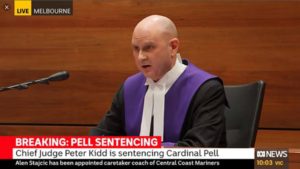In the Public Interest?
Reading Time: 3 minutes Even though the County Count had permitted the broadcast of sentencing remarks, and the sentencing of George Pell was of undoubted public interest in the global debate of sex abuse of children by the clergy, the media did not approach the Court for permission to provide the public with the opportunity to see the sentencing for themselves.
Even though the County Count had permitted the broadcast of sentencing remarks, and the sentencing of George Pell was of undoubted public interest in the global debate of sex abuse of children by the clergy, the media did not approach the Court for permission to provide the public with the opportunity to see the sentencing for themselves.  Consequently, the ABC is to be commended for taking up the Court’s proposal to broadcast the sentencing. The Court’s conditions for such coverage were that only one stationary camera was to be used, only the judge was to be shown, and only the judge’s reading of his sentence and the reasons for it were to be broadcast.
Consequently, the ABC is to be commended for taking up the Court’s proposal to broadcast the sentencing. The Court’s conditions for such coverage were that only one stationary camera was to be used, only the judge was to be shown, and only the judge’s reading of his sentence and the reasons for it were to be broadcast.  It appears that a gunman streamed-live his killings. Initially, it seems, some Australian media outlets refused to remove footage showing the killings in their entirety, in spite of requests from NZ police and the PM that they not broadcast the gunman’s gruesome propaganda footage. While Facebook removed the footage, network television continues to show the gunman’s footage right up to the moment when he raises his rifle to fire at a women standing near the door of a mosque.
It appears that a gunman streamed-live his killings. Initially, it seems, some Australian media outlets refused to remove footage showing the killings in their entirety, in spite of requests from NZ police and the PM that they not broadcast the gunman’s gruesome propaganda footage. While Facebook removed the footage, network television continues to show the gunman’s footage right up to the moment when he raises his rifle to fire at a women standing near the door of a mosque.
The last few days have demonstrated how in fulfilling their role of disseminating information of public interest, sectors of the media could not resist the temptation to provide information that may be of interest to sectors of the public yet not be in the public’s interest.
The Sentencing of George Pell
The first illustration of this is the media’s coverage of George Pell’s sentencing by Chief Judge Peter Kidd.
 Even though the County Count had permitted the broadcast of sentencing remarks, and the sentencing of George Pell was of undoubted public interest in the global debate of sex abuse of children by the clergy, the media did not approach the Court for permission to provide the public with the opportunity to see the sentencing for themselves.
Even though the County Count had permitted the broadcast of sentencing remarks, and the sentencing of George Pell was of undoubted public interest in the global debate of sex abuse of children by the clergy, the media did not approach the Court for permission to provide the public with the opportunity to see the sentencing for themselves. It is the Court that approached the media to enable such coverage to ensure that members of the public could witness and form their own opinions as to various aspects of the sentencing. In this regard the actions of the media were not unusual. Contrary to widely held perceptions that media organisations pester courts with requests to gain access to courts in order to provide the public with direct access to court proceedings of public interest and significance, my research revealed that in Australia and comparable overseas countries the media has shown little if any interest in providing the public with access to such information – even when invited to do so by courts.
 Consequently, the ABC is to be commended for taking up the Court’s proposal to broadcast the sentencing. The Court’s conditions for such coverage were that only one stationary camera was to be used, only the judge was to be shown, and only the judge’s reading of his sentence and the reasons for it were to be broadcast.
Consequently, the ABC is to be commended for taking up the Court’s proposal to broadcast the sentencing. The Court’s conditions for such coverage were that only one stationary camera was to be used, only the judge was to be shown, and only the judge’s reading of his sentence and the reasons for it were to be broadcast. On the whole, ABC Television complied with these conditions, imposed to ensure public access to, and therefore, understanding of the reasons for the Judge’s sentence, without impinging on the rights of those involved or observing the tribunal, or allowing other footage to skew or detract from the broadcast reasons.
Sadly, those at the ABC who directed the broadcast apparently could not resist the opportunity to engage in some tabloid journalism by editing-in a few minutes of split screen footage of a man outside the court, listening, with head in hands, to the broadcast of the sentence.
Not only was the footage jerky and swinging unevenly between the ground, shoes and the man being filmed, it was exploitative and a blatant attempt to sensationalise. Putting aside the likelihood that the camera person didn’t realise that her or his feed was being broadcast, this editing by the ABC only served to add a voyeuristic aspect that distracted from and possibly even undermined the information of public interest.
Responsible media would have sought to maximise the value of the sentencing remarks, placing interviews with victims and others before and/or after the sentencing.
Mass Killings in Christchurch
The second illustration relates to the broadcast and webcast of footage of the mass killing of Muslims in two Christchurch synagogues.
 It appears that a gunman streamed-live his killings. Initially, it seems, some Australian media outlets refused to remove footage showing the killings in their entirety, in spite of requests from NZ police and the PM that they not broadcast the gunman’s gruesome propaganda footage. While Facebook removed the footage, network television continues to show the gunman’s footage right up to the moment when he raises his rifle to fire at a women standing near the door of a mosque.
It appears that a gunman streamed-live his killings. Initially, it seems, some Australian media outlets refused to remove footage showing the killings in their entirety, in spite of requests from NZ police and the PM that they not broadcast the gunman’s gruesome propaganda footage. While Facebook removed the footage, network television continues to show the gunman’s footage right up to the moment when he raises his rifle to fire at a women standing near the door of a mosque. To make the public aware of the mass shooting is undoubtedly in the public’s interest. To repeatedly broadcast repulsive footage of the actual killings is nothing more than violent porn, or aiding and abetting the terror the gunman sought to disseminate through his live stream.
That the gunman’s footage, minus the actual killings, continues to be the preferred file footage accompanying ongoing media reports of the mass killings, cannot be justified as being in the public interest.
That some members of the public actually want to see the killings has nothing to do with the role of responsible media.
(Visited 14 times, 1 visits today)
I appreciate your Insight & compassion for the rule (s) of law and your expression of this. Keep it up
Thanks, Ron
I appreciate your encouragement
Danielwp